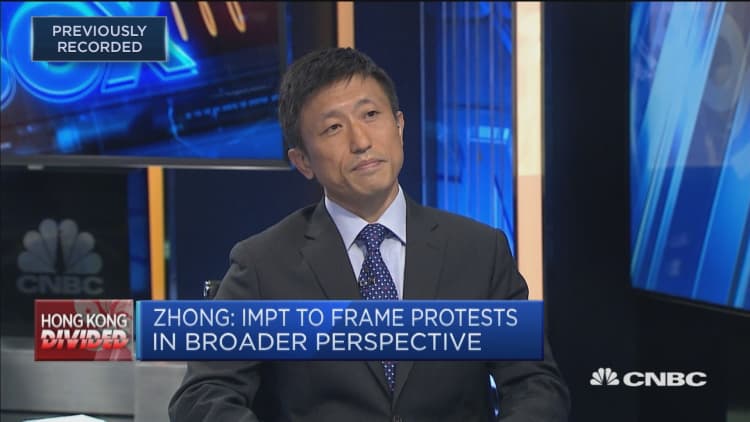
Hong Kong's leader Carrie Lam denied Tuesday that her government has lost control, and said she remained "committed" to serving its citizens despite continued calls for her resignation.
"I think a responsible chief executive at this point in time should continue to hold the fort, and do her utmost to restore law and order in Hong Kong," Lam, the city's chief executive, told reporters at a press conference. "I wouldn't say that my government has lost control. Day in day out, we are not only supporting the law enforcement bodies, we are also acting responsibly to deal with other issues that have arisen."
Since early June, hundreds of thousands have taken to the streets of Hong Kong — a former British colony that returned to Chinese rule in 1997.
Disruptive protests are likely to last as long as the government continues to neglect the demonstrators' demands.Kaho YuVerisk Maplecroft
The rallies started out as peaceful protests against a now-suspended extradition law that would have paved the way for suspects in Hong Kong to be sent to the mainland for trial. But those demonstrations have since turned more violent and disruptive, and snowballed into a wider pro-democracy movement — with some people also demanding full autonomy from Beijing.
Extradition bill
The violence in the anti-government protests has become increasingly serious, Lam said on Tuesday, but added she was confident Hong Kong would be able to take care of the crisis.
"I remain committed to serving the people of Hong Kong with humility," she added.
Lam, who is supported by China, suspended the proposed extradition law in July. She has repeatedly said the bill is "dead" but continues to refer to it as "suspended" instead of "withdrawn."
Protesters have called for the full withdrawal of the plan, among other demands.
"The government's failure to completely withdraw the extradition bill and widespread dissatisfaction with how the police have handled the protests have been the two most important drivers of the recent civil unrest," Kaho Yu, senior Asia politics analyst at consultancy Verisk Maplecroft, said in a note on Monday. "Disruptive protests are likely to last as long as the government continues to neglect the demonstrators' demands."
The protesters have called for the government to stop labeling their democracy movement a "riot" and to drop all charges against anti-extradition protesters. They also demanded for an independent committee to investigate the use of force by police.
Investor concerns
The months-long protests in Hong Kong have crippled the Asian financial center and ignited investor concerns.
Earlier in August, Hong Kong's government announced that it expected to lower its 2019 GDP growth forecast to between 0% and 1%, from the original range of 2% to 3%.
The immediate fallout from the protests have been tourism, as hotel occupancy rates, and
Retail sales have slumped and tourism has been hit, with hotel operators warning investors that the unrest could impact their bottom lines.The territory's real estate sector may also be hit.
The implicit threat is that there will be a price to pay for companies that do not actively support Beijing's political stance on Hong Kong.Kaho YuVerisk Maplecroft
Businesses in Hong Kong have also been caught up in the protests.
The CEO of Cathay Pacific, Rupert Hogg, resigned in mid August citing "recent events." The former chief of the Hong Kong airline had been under tremendous pressure from Beijing after some of its pilots and staff were found to have taken part in anti-government protests.
Major accounting firms in the territory reportedly issued statements to distance themselves from their staff who supported the anti-government protests.
"Public statements by big business in Hong Kong (suggest) that Beijing is applying pressure on firms with exposure to the mainland market as a means to try and stem the protest movement," Yu said in a note. "The implicit threat is that there will be a price to pay for companies that do not actively support Beijing's political stance on Hong Kong, which could range from state-backed consumer boycotts through to politicised regulatory probes on the mainland."
The Hong Kong and Macau Affairs Office did not immediately respond to CNBC's request for comment.
— CNBC's Grace Shao and Reuters contributed to this report.
WATCH: Hong Kong is not having an existential crisis: Analyst



